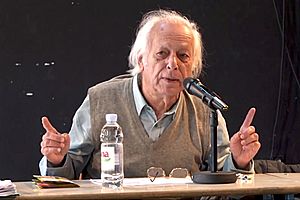Eurocentrism facts for kids

Eurocentrism (also called Western-centrism) is a way of looking at the world. It means seeing things mostly from the viewpoint of Western civilization. This can include all Western countries or just Europe. Sometimes, it even focuses only on Western Europe, especially during the Cold War.
When we talk about history, Eurocentrism can mean how people view European colonialism. This is when European countries took control of other lands. It also relates to other forms of imperialism, which is when one country extends its power over others.
Contents
What is Eurocentrism?
Eurocentrism is a way of thinking. It places Europe and Western cultures at the center of everything. This means their history, values, and ideas are seen as the most important. Sometimes, it can make other cultures seem less important. It's like looking at the world through a European lens.
How Did This Idea Start?
The idea of Eurocentrism grew over many centuries. It became stronger during the Age of Exploration. This was when European explorers traveled the world. They discovered new lands and cultures. Later, during the time of colonialism, European countries built large empires. They spread their influence across the globe. This often led to European ways of life being seen as the "normal" or "best" way.
Who Coined the Term?
The word Eurocentrism itself is quite new. It was first used in the 1970s. A famous thinker named Samir Amin helped make the term popular. He was an economist and political scientist. He used it to describe how Western ideas often dominate global discussions.
Why is Eurocentrism Important to Understand?
Understanding Eurocentrism helps us see different viewpoints. It makes us think about how history is told. It also helps us understand why some ideas are more common.
Different Ways of Looking at History
When history is taught, it can sometimes focus too much on Europe. This might mean that the stories of other continents are not fully told. For example, the history of Africa or Asia might be seen only in relation to Europe. Learning about Eurocentrism helps us look for other perspectives. It encourages us to learn about the rich histories of all cultures.
Impact on Culture and Ideas
Eurocentrism can also affect how we see culture. It might lead to Western art, music, or literature being seen as superior. However, every culture has its own unique and valuable contributions. Recognizing Eurocentrism helps us appreciate the diversity of human creativity. It encourages us to explore different cultural expressions from around the world.
Modern Day Relevance
Even today, Eurocentrism can be seen in many areas. It might appear in news coverage or in how global issues are discussed. Being aware of it helps us think critically. It allows us to question if a story is being told from a balanced perspective. This is important for understanding our diverse world.
See also
 In Spanish: Eurocentrismo para niños
In Spanish: Eurocentrismo para niños
 | Lonnie Johnson |
 | Granville Woods |
 | Lewis Howard Latimer |
 | James West |

